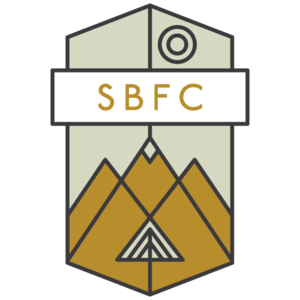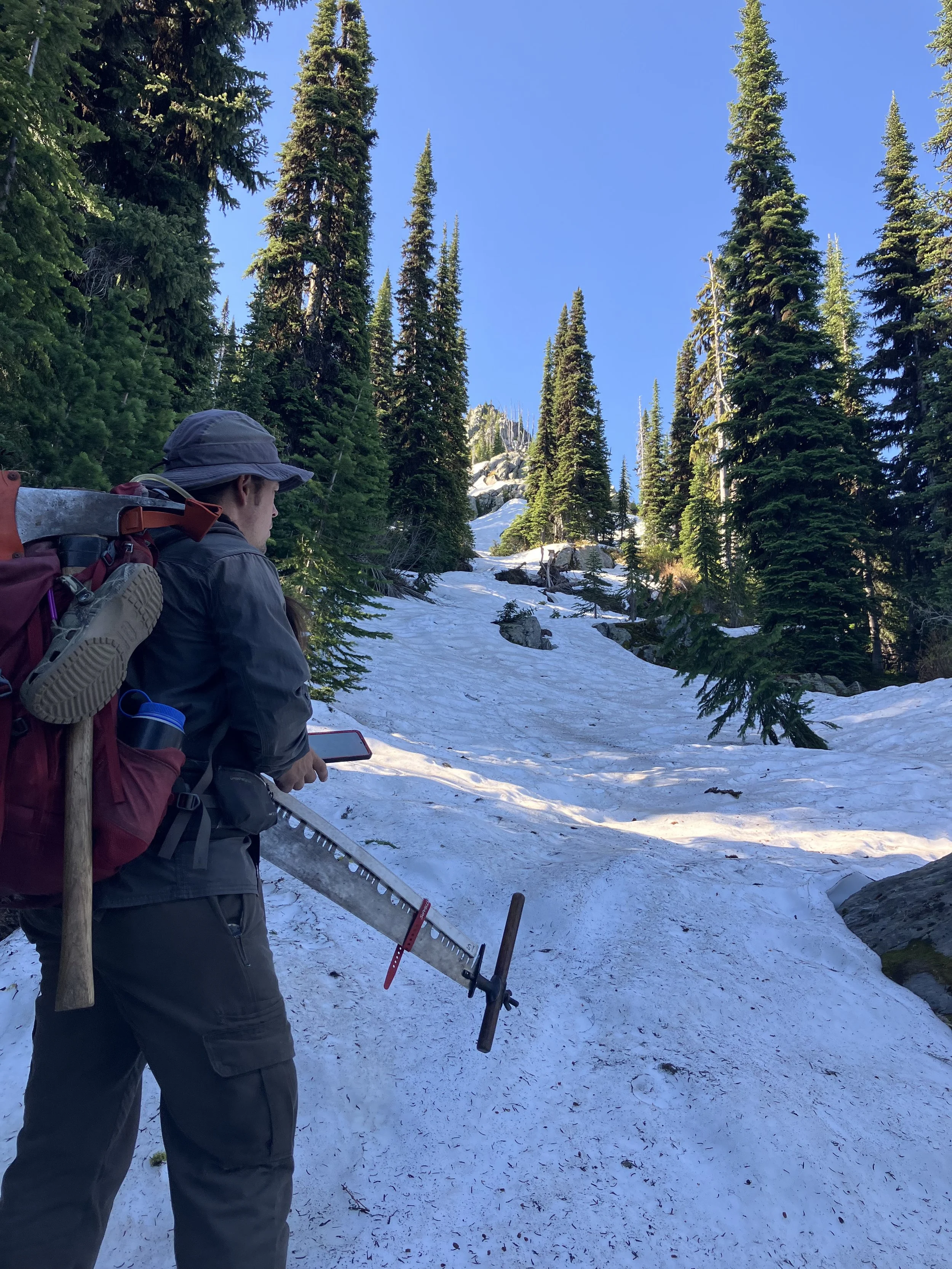Rowan Grassi
Wilderness Ranger Fellow
Surprise Creek Trail #219, NPC
June 19-26 2024
Group picture in front of Horse Camp. From left to right: Rowan Grassi, Nick Hutchins (USFS), Nate Thompson, Joe Ferris, Bailey Underwood. Photo Credit: Josh Page
In classic Selway-Bitterroot fashion the trail starts off with a climb. This part of the wilderness is so much wetter than the Missoula valley, and I delight in the lush green plants all around me. Up and off the river corridor, it’s still spring. I spot camas and shooting stars, countless glacier lilies, and the leaves of thimbleberry and summer flowers just popping out of the ground. Bear grasses are just starting to put their stalks up; their flowers are still some time away. Our destination today is Horse Camp: a forest service cabin along Boulder Creek, which is a cold, thigh-deep, swift-flowing creek that we end up crossing four times over the course of the hitch.
Nick Hutchens (USFS) looking up the snow-covered trail to the summit of Stanley Butte.
The crew consists of Joe as our lead and Nate, Bailey, and I as the Fellows. We are joined by Josh Page for a few days and Nick Hutchins (USFS) until Monday. Our goal is to clear along the Surprise Creek trail as far as possible, brushing and cleaning drains as we go.
On the Summer Solstice, we discovered a surprise of Surprise Creek: snow above 6,000 feet! The sporadic patches were cute down in the valley, but as we worked our way up to the alpine bowl of Seven Lakes, the trail quickly became obscured under multiple feet of snow. It was a hard climb, but we found an excellent campsite in the bowl. For me, it was a novel experience to hike around on that much snow, remembering the best ways to get around safely and what to do if and when a foot punches down through rotten snow. It was still cold enough that mosquitoes were rare, and I enjoyed swimming in the partially frozen lake near our camp and glissading down a small slope to get my water.
We spend the next several days cleaning drains and brushing, getting hypnotized by the sounds of the mosquitoes and the loppers chopping a steady eight-food-wide swathe through the understory. It’s the kind of work where, when I catch myself having thoughts, they’re either about dinner or the land around me.
Looking across one of the partially frozen lakes in the Seven Lakes area.
For example: maybe I’ll have pesto pasta and veggie sausage for dinner...if civilization came out of wilderness then wilderness is a construct that only came about when we started to separate ourselves from the wild. When there is no more wilderness, no more wild, will there still be civilization? Both the ‘wilderness’ and the ‘wild’ are concepts used to describe that which is outside of human control. To me, wildness is the state of being untamed or not controlled, whereas wilderness refers to a specific area of land that remains in a natural state. Wildness typically refers to the state or quality of being wild, untamed, or not domesticated. It can be used to describe the natural behaviors or characteristics of animals or plants that have not been bred or controlled by humans. It can also refer to the untamed or uncultivated aspects of nature, such as wild landscapes or untamed environments. Wilderness, on the other hand, generally refers to a natural environment that has not been significantly modified by human activity. It often denotes a large area of land that remains in a relatively undisturbed, natural state, free from modern human development or habitation.
Over the course of the season, my appreciation for the wilderness has deepened significantly, and it has firmly reinforced my desire to continue working outdoors. Immersing myself in backcountry work has allowed me to develop a passion for traditional skills such as crosscutting, and I’ve come to truly enjoy the challenge of cutting and untangling complex log piles. This season has taught me that even though our efforts may go largely unnoticed by the general public, the impact of our work is profound. By clearing trails and maintaining their integrity, we extend the life of the trail system, and allow people access to areas that would otherwise be unreachable. This realization highlights a fundamental truth about wilderness work—it operates on the principle of silent, selfless stewardship. The value of our labor is not always immediately visible or celebrated, but it is essential in preserving the natural beauty and accessibility of these spaces for future generations. The satisfaction comes not from recognition, but from a job well done and knowing that our efforts contribute to preserving the wilderness for those who will experience it after us.
Surprise Creek running through the meadow we camped in towards the end of the hitch. Photo Credit: Nate Thompson.
On Monday morning we say goodbye to Nick and leave our alpine camp, working our way back down Surprise Creek clearing drains and brushing dense alder and willow galleries as we go. There’s been a big snow melt over the last few days and I note newly uncovered patches of ground where spring plants are starting to grow. We camp at an old packer camp in the big meadow we passed on the way in. The shooting stars are still blooming and the mosquitoes try to drain us dry. Tuesday is much the same as we set our sights on Horse Camp.
It’s Wednesday and after working to close up Horse Camp it’s time to begin the walk out. Down through the spring blooms, into the green vegetal summer. Down towards the road. Towards civilization.
Fort Worth, TX
University of Montana- Ecosystem Science & Restoration
Over the past four years, Rowan has called Missoula and the surrounding landscape home. Having recently obtained a B.S. in Ecosystem Science & Restoration, he is excited to spend a summer with SBFC exploring and learning how to be a great steward to these beautiful public lands and wilderness areas. While he hasn’t done trail work before, Rowan is an experienced backpacker and is no stranger to doing fieldwork in remote areas. When he isn’t on the trail or in the lab, you can find him knitting, reading, biking around Missoula, and listening to loud music.





